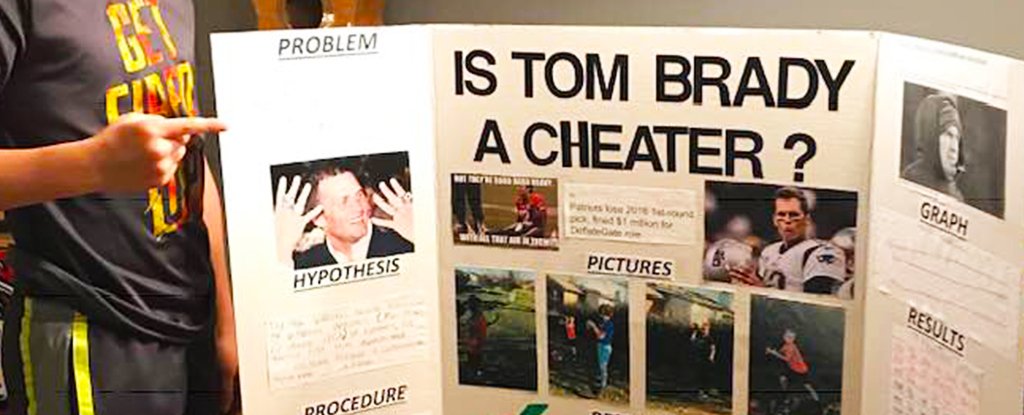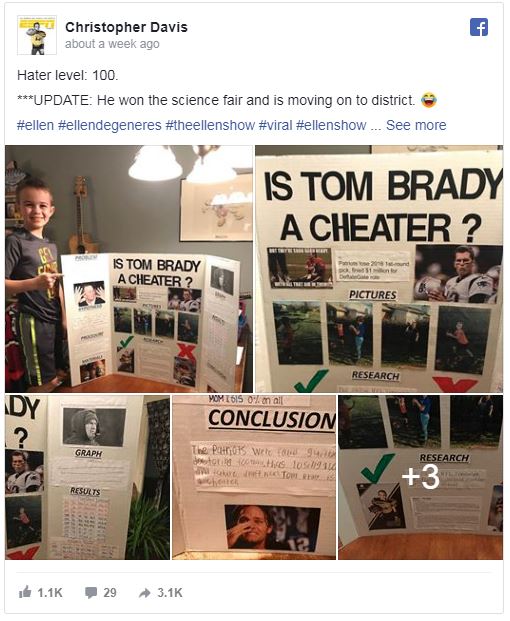Football
fans in the US can be divided into three camps – those who think the Patriots
victory against the Colts in the 2014/15 playoffs were given a helping hand by
slightly under inflated footballs, those who don't, and those who ask 'OMGcan't we just get on with football?!'
Over the
past few years, it seem like everybody has weighed in on the 'Deflategate'
controversy. Even science celebrity Bill Nye has aired his views. Now
10-year-old Ace Davis from Millcreek Elementary in Kentucky has weighed in as
well, and his words are literally prize winning.
Davis won a
local science fair by testing the hypothesis "under-inflated footballs
provide a competitive advantage in a game."
And just
what was his inspiration? According to an interview with the budding sports
scientist, vengeance played a part.
"Because
I hate Tom Brady, he's been accused of cheating before, I want him to be
caught," Davis told NFL Draft Diamonds' reporter Damond Talbot.
If you're
one of the billions of people on this planet who have no idea what Deflategate
is, or why Tom Brady might have earned the wrath of a young football fan,
here's a quick recap.
On 18
January 2015, the New England Patriots played against the Indianapolis Colts in
the annual American Football Conference Championship Game.
During the
first half, Colts linebacker D'Qwell Jackson received a pass from the Patriot's
star quarterback, Tom Brady. This ball was eventually put into the hands of NFL
officials, who suspected something fishy.
Official NFL
rules require game balls to be inflated to a pressure of between 12.5 and 13.5
pounds per square inch. This ball – among others – was found to be a couple of
pounds too squishy.
A ball with
more 'give' should – technically – be a little easier to throw and catch,
improving accuracy. So a slightly under-inflated regulation football might have
given an offensive position some kind of advantage.
Maybe.
Since 2006,
whoever is in offense provides the ball in play. So Brady was accused of at
least knowing about the ball's dubious integrity, and the quarterback was
suspended; a ruling that was then overturned. And upheld again.
Clearly Ace
Davis had his own strong opinion on the matter, and decided to use that as
fodder for a science fair project.
To get to
the bottom of whether this softer football gave the Patriots an advantage,
Davis employed his sister and his mother to throw three footballs inflated to
different pressures. His proud father posted Ace's achievements on social
media, as seen below (full Facebook post here).
Balls were
thrown, distances measured, averages recorded, accuracies evaluated, a graph
was drawn in pencil, and a conclusion was reached.
"Tom
Brady is indeed a cheater," Davis wrote.
Look, nobody
here at ScienceAlert is qualified to weigh in on sportsballs controversies. But
we do like our science, and while we're pretty sure Ace Davis's study wouldn't
pass peer review for journals like Nature, it's clear he's put some good
thought into his experiment.
Maybe next
year he could investigate cricket balls instead? Just a thought.


Comments
Post a Comment